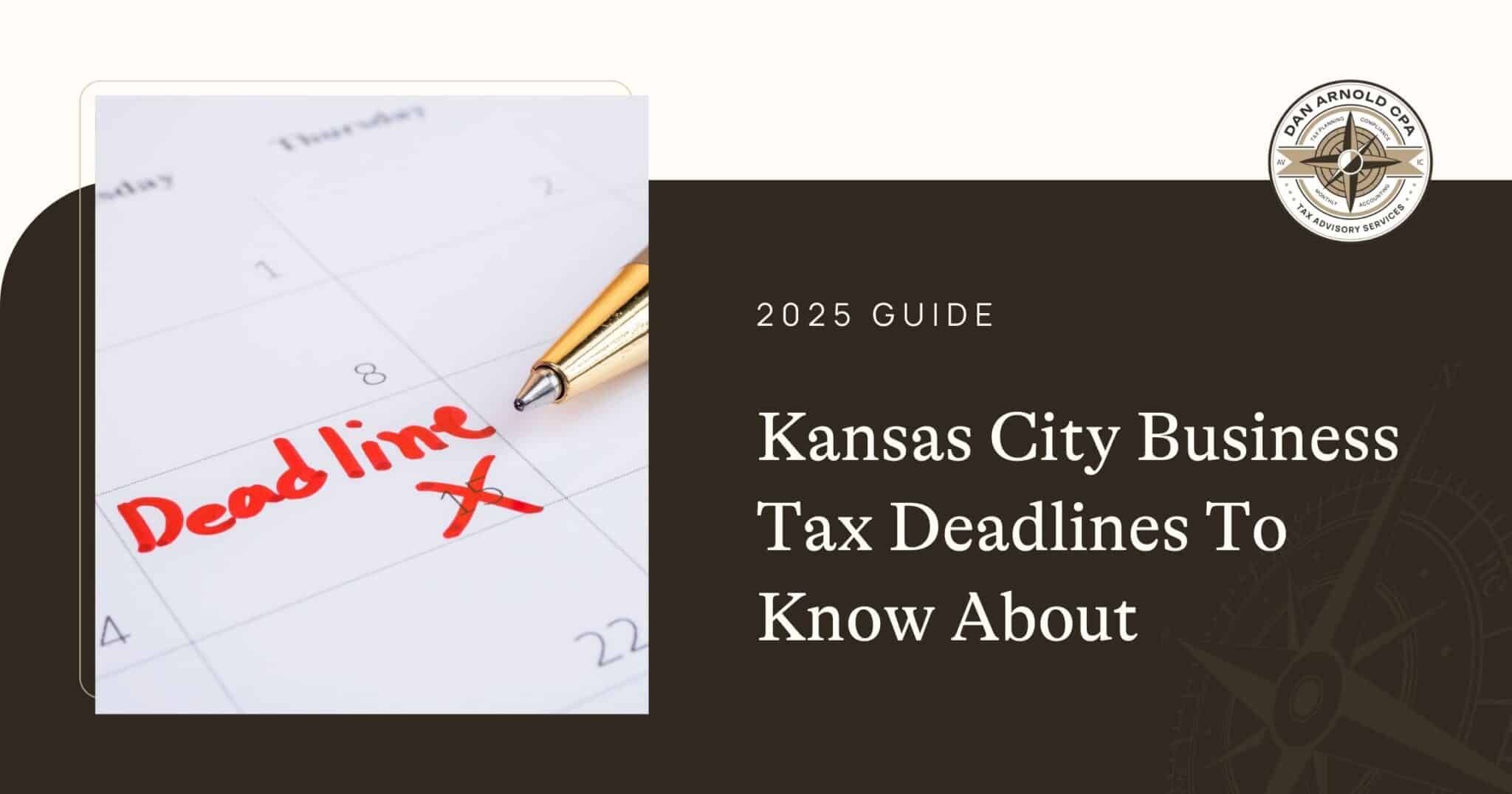So, you finally did it—you started your own business in Kansas City. Maybe it’s a small restaurant, a consulting firm, or an e-commerce shop. Either way, congrats! Running your own business is exciting, but let’s be honest—taxes can be confusing and a little terrifying.
When are things due?
What happens if you miss a deadline?
What the heck are estimated taxes?
Don’t worry—I’ve got you.
In this guide, we’re going to break down the major business tax deadlines you need to know in 2025 as a business owner in Kansas City. I’ll keep it simple, give you examples, and make sure you don’t get caught off guard.
First, Let’s Talk About Estimated Taxes
If you’re new to running a business, you might not know about quarterly estimated taxes—and that’s a problem, because missing them can lead to penalties.
Here’s the deal: If you don’t have taxes automatically withheld from a paycheck (like employees do), the IRS and Kansas state expect you to pay taxes throughout the year instead of in one lump sum in April.
Think of it like this: If you had a traditional job, your employer would withhold a portion of your paycheck for taxes each pay period. When you’re self-employed or own a business, no one is doing that for you, so you have to send in those payments yourself—four times a year.
Here’s when they’re due in 2025:
- January 15 – For income earned in October, November, and December 2024
- April 15 – For income earned in January, February, and March 2025
- June 15 – For income earned in April and May 2025
- September 15 – For income earned in June, July, and August 2025
One important thing to note: If you miss a deadline, the IRS will charge you penalties and interest, even if you pay everything when you file your tax return. So set calendar reminders, or better yet, let a Kansas City CPA handle it for you.
Example: How Estimated Taxes Work in Real Life
Let’s say you run a small Kansas City marketing agency and make $120,000 per year. You estimate that you’ll owe about $30,000 in taxes for the year.
Instead of paying that all in April 2026 (ouch), you break it into four estimated tax payments of $7,500 each quarter. That way, you stay in the IRS’s good graces and avoid underpayment penalties.
At Dan Arnold, CPA, we help business owners figure out exactly how much to pay each quarter so they don’t overpay or underpay.
Federal Deadlines to Know
Estimated taxes are just one piece of the puzzle. Here are all the other key tax deadlines you need to know about.
April 15, 2025 – The Big One
This is the Super Bowl of tax deadlines—the day when a whole bunch of taxes are due:
- Your 2024 personal income tax return is due (if you’re a sole proprietor, LLC, or freelancer, this includes your business income).
- Your first estimated tax payment for 2025 is due.
- Corporate tax returns (Form 1120) are due for C-corporations.
If you file an extension, it only gives you extra time to file—not extra time to pay. So if you owe taxes, you still need to estimate and send in a payment by April 15.
June 15, 2025 – Second Estimated Tax Payment
This one sneaks up on a lot of business owners. You’re just getting over tax season, and suddenly, the IRS wants more money.
This is your second estimated tax payment, covering income earned in April and May. If you’re making more money than expected, you might need to adjust your payments so you don’t get hit with a big tax bill later.
September 15, 2025 – Third Estimated Tax Payment
By now, you’ve hopefully gotten into the habit of making estimated payments. This one covers income earned in June, July, and August.
If you own an S-corp or a partnership, this is also the due date for your business tax return if you filed an extension back in March.
October 15, 2025 – Extended Tax Returns Are Due
If you filed an extension for your personal tax return, this is the final deadline to get it done. No more delays.
December 15, 2025 – Last Call for Corporate Estimated Taxes
Corporations follow a slightly different estimated tax schedule, and this is the last estimated tax payment for C-corporations.
January 15, 2026 – The Final Estimated Tax Payment for 2025
This wraps up the estimated tax payments for the previous year. After this, all eyes are on April 15, 2026, when it all starts over again.
Kansas City-Specific Taxes You Can’t Ignore
Here’s the part most people don’t realize until it’s too late—Kansas City has its own local income tax system.
There are two parts to it: one applies to you as a person, and one applies to your business.
The Wage Earner’s Tax (1%)
If you live or work within Kansas City, Missouri, you’re required to pay a 1% earnings tax on wages. This includes employees and business owners alike. It’s separate from state and federal taxes, and you’ll include it when you file your Kansas City return if you’re over or underpaid. Remember, in order to claim a refund the return must be filed or formally extended by April 15th of each year.
The Profits Return (Form RD-108)
If your business operates in Kansas City—even if you don’t live there—you may also need to file a Profits Return for any apportioned income. This applies to most business entities, including partnerships, S corps, sole proprietors, and corporations. If you made net profit from business activities conducted in Kansas City, you’ll owe that 1% local tax on the apportioned income.
Filing deadlines for Kansas City typically match the IRS schedule, with April 15 as the big one for both the wage earner tax return and the profits return.
If you’re unsure whether your business is subject to KC local taxes, it’s worth asking a local KC CPA (get in touch!)—because Kansas City does enforce harsh penalties for missing or late filings.
Kansas City Business License – Due End of February
In addition to income-based filings, most businesses operating in Kansas City are also required to file for a Business License. This isn’t just a one-time registration, it’s an annual requirement.
The license is based on your estimated gross receipts for the year, and the tax rate varies depending on your industry. So, a retail store will be taxed differently than a consulting firm, for example. You’ll estimate your gross receipts, apply the correct industry rate, and submit the license application—and payment—by the end of February each year.
This is one of those city-specific requirements that’s easy to overlook, especially for new business owners or out-of-town companies doing business in KC. But failing to file can result in penalties, interest, and problems with renewing other city permits.
Missouri State Tax Deadlines
If your business is based in Missouri, or you live in Missouri and run your business there, you’ll also need to file a Missouri state tax return.
For Individuals
If you’re a sole proprietor, freelancer, or single-member LLC, your business income will be reported on your Missouri Individual Income Tax Return (Form MO-1040). Missouri will decrease its top marginal individual income tax rate from 4.8 percent in 2024 to 4.7 percent effective January 1, 2025.
This reduction is part of a series of tax cuts initiated under legislation enacted in 2022 (SB 3 and SB 5), which allow for a 0.1 percentage-point decrease each year that revenue goals are met, until the top rate reaches 4.5 percent.
For C Corporations
If your business is a C corp, you’ll file a corporate income tax return (Form MO-1120). Missouri’s corporate income tax rate is 4%, which is lower than many other states—but still separate from your federal corporate return.
For Sales and Payroll
If you sell taxable goods or services, you’re required to collect and file Missouri sales tax—typically monthly, quarterly, or annually based on your volume. If you have employees, you’ll also need to file Missouri employer withholding tax and remit payroll taxes to the state.
The due dates for these vary based on your filing frequency, but most monthly filings are due around the 15th or 20th of the following month. It’s a lot to keep up with, which is why most business owners don’t go it alone.
And If You’re in Kansas…
If your business is located in Kansas (or you’re a Kansas resident), similar rules apply—but with different forms and tax rates. You’ll file a Kansas individual return (Form K-40) and possibly Kansas sales tax or employer withholding returns depending on how your business operates.
Kansas’s state income tax rates range from 3.1% to 5.7%, and like Missouri, there are strict deadlines tied to your filing frequency.
How to Stay on Top of All This
Yes, that’s a lot of dates.
You’re juggling federal taxes, state filings, Kansas City earnings taxes, and possibly payroll and sales tax—and that’s before we even talk about bookkeeping.
Here’s what we recommend:
- Start by setting calendar reminders for each due date. Seriously, put them in your phone or Google Calendar now.
- Use accounting software like QuickBooks or Xero to help track income, expenses, and taxes automatically.
- And most importantly—work with a local Kansas City CPA who actually understands what’s required in Kansas City.
Which is us!
At Dan Arnold CPA, LLC, we handle estimated tax payments, business tax returns, and state filings so that our clients never miss a deadline.
If you’re tired of trying to figure this all out on your own, let’s chat. We’ll make sure you stay compliant—and help you keep more of your hard-earned money.
Remember—taxes don’t have to be a headache. You just need a great CPA.
Head over to our Getting Started page to book your first introductory call. We’re always here to help.
Until next time!


